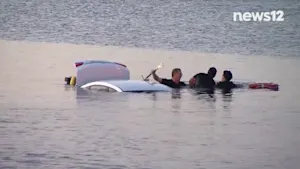More Stories
The fate of a former
pit bull rescue president accused of starving five dogs to death is now in the
hands of a judge.
Heidi Lueders did not take the stand Tuesday nor did any witness
for the defense. Instead, both sides made their closing arguments with about 30
people watching from the back of the courtroom, many of them animal advocates.
“The state submits that it has proved beyond a reasonable
doubt, that Heidi Lueders intentionally killed all five of these dogs,” said
Assistant State’s Attorney Felicia Valentino.
Valentino recapped testimony from the 10 witnesses she
called during Lueders’ trial on five counts of maliciously killing an animal
and one count of criminal damage to property. That testimony included Lueders’
landlord, Celly Roberts. Last week Roberts told the court she went into the
home on Nov. 14, 2018 and found the dogs’ remains. Roberts also testified the
home was filled with dog feces, garbage and drug paraphernalia.
MORE: 'Smell of rotting flesh.' Trial begins against former pit bull rescue president accused of killing dogs
MORE: 'They were decomposed almost totally:' Animal control officers and detective take stand in day 2 of accused dog killer's trial
MORE: Expert testifies he believes dogs in Heidi Lueders case died from lack of food and water
MORE: State rests case in trial of accused Fairfield dog killer
MORE: 'They were decomposed almost totally:' Animal control officers and detective take stand in day 2 of accused dog killer's trial
MORE: Expert testifies he believes dogs in Heidi Lueders case died from lack of food and water
MORE: State rests case in trial of accused Fairfield dog killer
When Fairfield police officers took the stand earlier in
the trial, they told the court the home at 37 Prince St. smelled of rotting
flesh.
“Your honor can infer from her actions of locking these
five dogs in cages and one in a bedroom and withholding food and water that her
intent was to kill them, “ Valentino said.
But Lueders’ defense attorney, Rob Serafinowicz, argued the evidence isn't
there to prove guilt beyond a reasonable doubt.
“The theme in this
case is they simply did not meet their burden,” Serafinowicz said. “And at
best, the state has allowed the court to draw a conclusion that the defendant
is probably guilty.”
Serafinowicz centered in on testimony from Dr. Herbert Van Kruiningen, a now retired veterinary
pathologist, who examined the dogs post-mortem. Van Kruiningen said the
necropsy could not determine cause of death because the remains had decomposed
to just bones.
“The answers he gave simply do not amount to
enough evidence for the state to prove the elements of the crime beyond a
reasonable doubt,” Serafinowicz said. “I think it's safe to say in this case, there's no way of
knowing how these animals died.”
But Valentino
countered Van Kruiningen came up with a cause after looking beyond the bones to
other evidence in the file. He testified he believed the dogs died from lack of
food and water.
“Further, the state submits to your honor that
Ms. Lueders knew how to properly care for these dogs having been a dog owner,
rescue owner and a dog trainer,” Valentino said.
Valentino added that while these dogs were left to suffer,
Lueders fed three other dogs she had in the home. Valentino also recounted
testimony from the state’s final witness—the detective who arrested Lueders.
“She knew what she did was wrong based on her statements
made to Detective Dalling, who characterized her appearance and body language as
remorseful. She told Detective Dalling, ‘I can't believe I did this,’” Valentino
said.
Serafinowicz argued that the public outrage in this case,
not the facts, is why the Lueders even went to trial. “This is clearly a case
that was influenced by the fact that people didn't like the fact pattern as
opposed to the law involved,” he said.
Judge Peter McShane will
announce his verdict Wednesday afternoon. Lueders opted for a trial by judge
rather than jury.
More from News 12
2:34

Guide: Safety tips to help prevent home burglaries
2:19

Guide: Safety measures to help prevent fires and how to escape one
2:07

Tips on how to avoid confrontation with sharks while swimming in the ocean
2:33

5 tips to prevent mosquito bites and getting sick from viruses
2:39

NEWS 12 EXCLUSIVE: ‘He drove into the water.’ Car drives off dock in Patchogue; News 12 crew helps in the rescue
0:44
